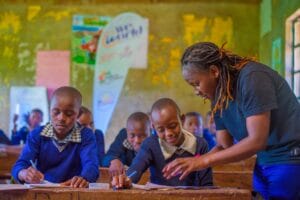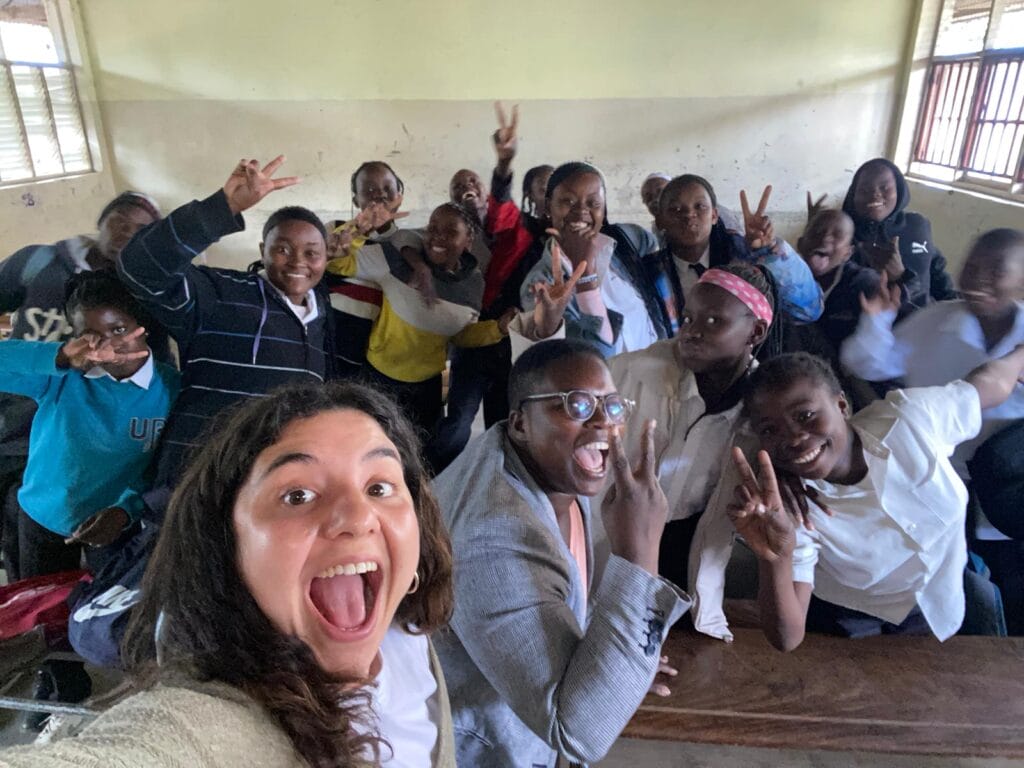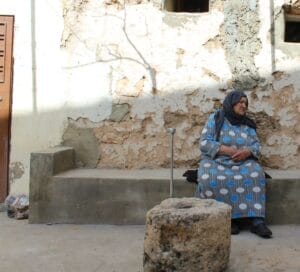
Who would have thought that theatre could be a powerful tool to challenge social norms and break taboos? In Mozambique, we have brought theatre into schools, reaching students and communities alike. Through carefully crafted performances, theatre specialists have created a safe space where both young people and adults can see their everyday experiences reflected on stage and engage with important social issues.
One of the major challenges faced by young people and adults in Mozambique revolves around sensitive topics such as gender-based violence, infertility, and early marriages.
The experience of Araceli, Humanitarian Volunteer in Mozambique
Araceli is one of the volunteers who joined WeWorld thanks to the European Solidarity Corps project MOREYOUNG funded by the European Union and in partnership with Acción contra el Hambre.
"As a volunteer with WeWorld in Mozambique, I have had the opportunity to follow these activities closely, witnessing their impact and working to ensure their sustainability over time. During a monitoring session at a school in Matola A, one of the most powerful moments - beyond the enthusiasm and warmth with which we were welcomed - was the students’ strong desire for more sessions. They were eager to explore additional topics, offered thoughtful feedback on how we could improve, and voiced concerns of their own, such as violence in schools and drug use. These are issues they hoped we would address in future programming, reflecting not only the relevance of our work but also the critical need for continued dialogue and support.
This was particularly evident during the second phase of the gender activities of the "MangAction" project, where new mobilization strategies were implemented to address issues more effectively. "The theatre play brought segments that spoke directly to adults, such as infertility, but also addressed forced unions and early marriages, engaging both boys and girls," shared one of the participants. The initiative was presented in various schools, including those in Matola and Inhaca Island, successfully engaging over 3,500 people. The performance not only raised awareness but also encouraged discussions about gender violence prevention, showing the transformative potential of schools as spaces for social mobilization. One of the most impactful aspects of the project was the way it resonated with different generations. "At first, the students were hesitant to engage in discussions about gender relations, but as the performances went on, they opened up and shared their perspectives," noted a local teacher.
My colleague and gender specialist, Graça Rita de João, plays a crucial role in these activities. Accompanying her throughout this process has allowed me to witness firsthand how such initiatives unfold from beginning to end. Graça is an energetic, passionate educator with remarkable patience and a wealth of knowledge on gender-based violence in Mozambique. Her ability to engage with children, not just professionally but on a personal level, fosters a trusting environment where they feel encouraged to participate, speak up, and learn. Thanks to her guidance, I have come to appreciate the importance of understanding one's audience and tailoring engagement strategies accordingly.
Following the monitoring sessions, we gathered to present our findings and brainstorm future actions. This culminated in a workshop on Inhaca Island, where local leaders, teachers and the district leader came together to discuss the next steps for sustaining and expanding these initiatives. The experience reaffirmed that theatre is not just a form of entertainment - it is a transformative tool that empowers communities, sparks dialogue and paves the way for meaningful social change. As one participant expressed, "We hope these performances continue, but more importantly, that they reach more communities and remain a lasting source of learning and discussion."
Do you want to join us as ESC Humanitarian Aid Volunteer? Find info on how to participate here!

Funded by the European Union. Views and opinions expressed are however those of the author(s) only and do not necessarily reflect those of the European Union or EACEA. Neither the European Union nor the granting authority can be held responsible for them.



